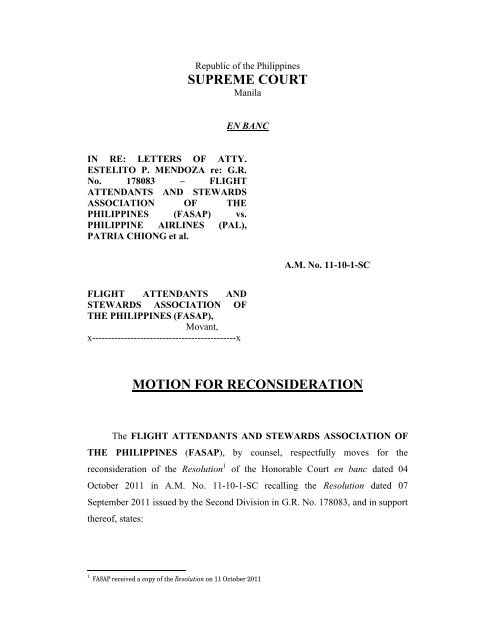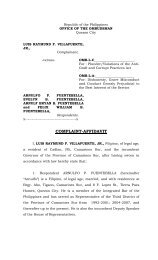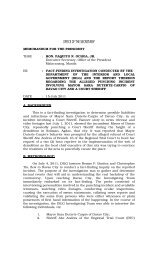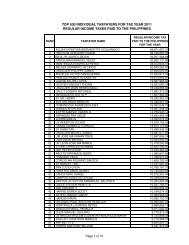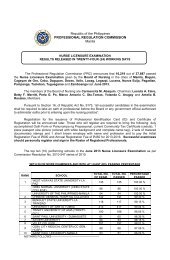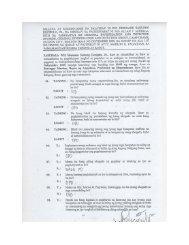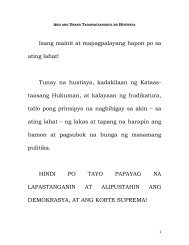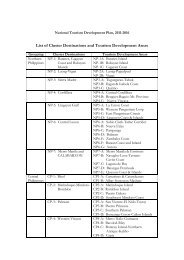SUPREME COURT MOTION FOR RECONSIDERATION - InterAksyon
SUPREME COURT MOTION FOR RECONSIDERATION - InterAksyon
SUPREME COURT MOTION FOR RECONSIDERATION - InterAksyon
Create successful ePaper yourself
Turn your PDF publications into a flip-book with our unique Google optimized e-Paper software.
Republic of the Philippines<br />
<strong>SUPREME</strong> <strong>COURT</strong><br />
Manila<br />
EN BANC<br />
IN RE: LETTERS OF ATTY.<br />
ESTELITO P. MENDOZA re: G.R.<br />
No. 178083 – FLIGHT<br />
ATTENDANTS AND STEWARDS<br />
ASSOCIATION OF THE<br />
PHILIPPINES (FASAP) vs.<br />
PHILIPPINE AIRLINES (PAL),<br />
PATRIA CHIONG et al.<br />
A.M. No. 11-10-1-SC<br />
FLIGHT ATTENDANTS AND<br />
STEWARDS ASSOCIATION OF<br />
THE PHILIPPINES (FASAP),<br />
Movant,<br />
x---------------------------------------------x<br />
<strong>MOTION</strong> <strong>FOR</strong> <strong>RECONSIDERATION</strong><br />
The FLIGHT ATTENDANTS AND STEWARDS ASSOCIATION OF<br />
THE PHILIPPINES (FASAP), by counsel, respectfully moves for the<br />
reconsideration of the Resolution 1 of the Honorable Court en banc dated 04<br />
October 2011 in A.M. No. 11-10-1-SC recalling the Resolution dated 07<br />
September 2011 issued by the Second Division in G.R. No. 178083, and in support<br />
thereof, states:<br />
1 FASAP received a copy of the Resolution on 11 October 2011
Page 2 of 10<br />
GROUNDS<br />
I.<br />
THE RESOLUTION OF THE SECOND DIVISION IN G.R. NO.<br />
178083 IS A VALID FINAL AND EXECUTORY JUDGMENT.<br />
IT IS THERE<strong>FOR</strong>E LEGALLY IMMUTABLE AND SHOULD<br />
NOT HAVE BEEN RECALLED.<br />
established.<br />
1. The doctrine on the immutability of a final judgment is well<br />
2. This most basic and long standing rule is as follows:<br />
“A decision which has attained finality becomes<br />
immutable and unalterable. This quality of<br />
immutability precludes the modification of a final<br />
judgment, even if the modification is meant to correct<br />
erroneous conclusions of fact and law. And this<br />
postulate holds true whether the modification is made by<br />
the court that rendered it or by the highest court in the<br />
land. The orderly administration of justice requires<br />
that, at the risk of occasional errors, the<br />
judgments/resolutions of a court must reach a point of<br />
finality set by law. The noble purpose is to write finis to<br />
dispute once and for all. This is a fundamental principle<br />
in our justice system, without which there would be no<br />
end to litigations.” 2 (Emphasis supplied)<br />
2 In the Matter of the Heirship (Intestate Estates) of the Late Hermogenes Rodriguez, Antonio Rodriguez, Macario J.<br />
Rodriguez, Delfin Rodriguez and Consuelo Rodriguez and Settlement of the their Estates - Rene B. Pascual,<br />
Petitioner vs. Jaime Robles, Respondent, G.R. No. 182645, 22 June 2011 citing Mocorro, Jr. v. Ramirez, G.R. No.<br />
178366, 28 July 2008 [560 SCRA 362]
Page 3 of 10<br />
3. In Airline Pilots Association of the Philippines vs. Philippine Airlines,<br />
Inc., 3 the Honorable Court ruled that subject to certain recognized exceptions, the<br />
principle of immutability leaves a final and executory judgment undisturbed “as<br />
nothing further can be done except to execute it.” 4<br />
4. The only exceptions to the rule on the immutability of final judgments<br />
are (1) the correction of clerical errors, (2) the so-called nunc pro tunc entries<br />
which cause no prejudice to any party, and (3) void judgments. x x x.” 5 None of<br />
the above-mentioned exceptions are attendant in this case.<br />
5. The 07 September 2011 Resolution of the Second Division of the<br />
Honorable Court denying the second motion for reconsideration of Philippine<br />
Airlines, Inc. of the 22 July 2008 Decision in G.R. No. 178083 6 is a valid final and<br />
executory decision rendered by the Honorable Court on the merits of the case, and<br />
in the proper exercise of its appellate jurisdiction. It is therefore immutable and<br />
unalterable.<br />
6. The jurisdiction of the Second Division of the Honorable Court to<br />
render the 07 September 2011 Resolution is beyond all question. Under the<br />
Constitution, judicial power shall be vested in ONE Supreme Court and in such<br />
lower courts as may be established by law. 7 Because of this constitutional<br />
principle of singularity of the Supreme Court, it is thus of no moment whichever of<br />
its divisions issued the Resolution. A decision by any of the Supreme Court’s three<br />
divisions is legally the decision of the Supreme Court itself. As held in J.G.<br />
Summit Holdings, Inc. vs. Court of Appeals: 8<br />
“Again, we emphasize that a decision or resolution of<br />
a Division is that of the Supreme Court and the Court<br />
3 G.R. No. 168382, 06 June 2011<br />
4 Footnote omitted<br />
5 Supra note 2<br />
6 Entitled “Flight Attendants and Stewards Association of the Philippines vs. Philippine Airlines, Inc, Patria Chiong et<br />
al.”<br />
7 Article VIII, Section 1, first paragraph, Constitution<br />
8 G.R. No. 124293, 31 January 2005 [450 SCRA 169, 185]
Page 4 of 10<br />
en banc is not an appellate court to which decisions or<br />
resolutions of a Division may be appealed.” 9<br />
7. Thus, the 07 September 2011 Resolution remains valid regardless of<br />
any alleged technical infirmity arising from the application of the Supreme Court’s<br />
Internal Rules. In other words, any alleged technical lapse, not being grounded on<br />
lack of jurisdiction, violation of due process or existence of fraud or collusion,<br />
cannot render the 07 September 2011 Resolution void so as to constitute an<br />
exception to the rule on immutability.<br />
8. For the above reasons, the 07 September 2011 Resolution issued by<br />
the Second Division of the Honorable Court, having attained finality, is already<br />
immutable and cannot legally be recalled.<br />
II.<br />
THE RESOLUTION RECALLING THE 07 SEPTEMBER 2011<br />
RESOLUTION IN G.R. NO. 178083 DOES NOT PROVIDE THE<br />
REASON THERE<strong>FOR</strong>. CONSEQUENTLY, SUCH RECALL IS<br />
VOID <strong>FOR</strong> BEING VIOLATIVE OF DUE PROCESS.<br />
9. With all due respect, it is the position of movant FASAP that it is the<br />
recall order of 04 October 2011 instead which is void for having been issued in<br />
violation of the Constitution.<br />
10. Article VIII, Section 14 of the Constitution provides that “(n)o<br />
decision shall be rendered by any court without expressing therein clearly and<br />
distinctly the facts and the law on which it is based.”<br />
11. In the instant case, the Honorable Court en banc recalled the Second<br />
Division’s 07 September 2011 Resolution in G.R. No. 178083 without providing<br />
any reason for such recall. The en banc Resolution dated 04 October 2011 merely<br />
9 Footnotes omitted
Page 5 of 10<br />
reads: “the Court En Banc further resolves to recall the resolution dated September<br />
7, 2011 issued by the Second Division in this case.”<br />
12. In this regard, belated yet seemingly unsuccessful attempts before<br />
mass media to explain the recall of the 07 September 2011 Resolution cannot work<br />
to cure or remedy the fatal failure to provide any legal basis for the 04 October<br />
2011 Resolution.<br />
13. FASAP’s right to be informed of the legal basis for the recall of the 07<br />
September 2011 Resolution of the Honorable Court is a paramount component of<br />
due process and fair play. This is especially true as the concomitant right of some<br />
1,400 FASAP members and that of their families to execute an already final and<br />
executory decision is adversely affected by said recall. In light of the foregoing,<br />
the 04 October 2011 Resolution of the Honorable Court should be reconsidered<br />
and set aside for being violative of due process of law.<br />
III.<br />
THE RESOLUTION RECALLING THE 07 SEPTEMBER 2011<br />
RESOLUTION IN G.R. NO. 178083 IS ALSO VOID <strong>FOR</strong><br />
AGAIN BEING VIOLATIVE OF DUE PROCESS, ARISING AS<br />
IT DOES FROM AN EX-PARTE CONSIDERATION OF MERE<br />
LETTERS FROM COUNSEL OF THE PHILIPPINE<br />
AIRLINES, INC.<br />
14. It is also the submission of FASAP that it was deprived of the right to<br />
be heard on the matter of the recall order and was thus again denied its<br />
constitutionally guaranteed right to due process of law.<br />
15. The records show that herein movant FASAP, which is a party to the<br />
case, was never furnished by the counsel for PAL with copies of his letters subject<br />
matter of the instant Administrative Matter.
Page 6 of 10<br />
16. Equally important, the Honorable Court acted upon the said letters by<br />
peremptorily recalling the 07 September 2011 Resolution of the Second Division<br />
without giving FASAP the opportunity to comment on or oppose the said letters.<br />
17. Notice and hearing, the rudimentary elements of due process, are thus<br />
clearly absent under the circumstances. Again, this notwithstanding that the recall<br />
order adversely affects the substantive rights of FASAP’s retrenched members.<br />
IV.<br />
THE RECALL OF THE 07 SEPTEMBER 2011 RESOLUTION<br />
IN THE INSTANT ADMINISTRATIVE MATTER IS NOT A<br />
VALID EXERCISE OF THE HONORABLE <strong>COURT</strong>’S<br />
FUNCTIONS, WHETHER JUDICIAL OR ADMINISTRATIVE.<br />
18. There is nothing in the Constitution, or in any law or rule for that<br />
matter, which grants the Honorable Court the authority to “recall” a final and<br />
executory judgment, such as the 07 September 2011 Resolution.<br />
19. Article VIII, section 5 (2) defines scope of the appellate jurisdiction of<br />
the Court as follows:<br />
“(2) Review, revise, reverse, modify, or affirm on appeal or<br />
certiorari, as the law or the Rules of Court may provide, final<br />
judgments and orders of lower courts in:<br />
(a) All cases in which the constitutionality or validity of any<br />
treaty, international or executive agreement, law, presidential<br />
decree, proclamation, order, instruction, ordinance, or<br />
regulation is in question.<br />
(b) All cases involving the legality of any tax, impost,<br />
assessment, or toll, or any penalty imposed in relation thereto.<br />
(c) All cases in which the jurisdiction of any lower court is in<br />
issue.<br />
(d) All criminal cases in which the penalty imposed is reclusion<br />
perpetua or higher.<br />
(e) All cases in which only an error or question of law is<br />
involved.”
Page 7 of 10<br />
20. To “recall” a valid final and executory decision does not fall among<br />
the above enumerated powers of the Supreme Court under the Constitution.<br />
21. This is especially true when the Honorable Court exercises purely<br />
administrative functions – as in the instant Administrative Matter docketed as A.M.<br />
No. 11-10-1, where the Honorable Court entertained the letters of Atty. Estelito P.<br />
Mendoza regarding the 07 September 2011 Resolution in G.R. No. 178083.<br />
22. Certainly, the “recall” of a valid final and executory decision in a case<br />
rendered in the Honorable Court’s exercise of its judicial functions cannot be<br />
deemed a proper exercise of its administrative functions. The Supreme Court’s<br />
Internal Rules enumerates its administrative functions as follows:<br />
Rule 4. Section 3. Administrative functions of the Court.<br />
– The administrative functions of the Court en banc consist of,<br />
but are not limited to, the following:<br />
(a) the discipline of justices, judges and court personnel,<br />
whether by en banc or by Division, subject to matters assignable<br />
to the Divisions, disciplinary matters involving justices, judges<br />
and court personnel;<br />
(b) the temporary assignment of judges to other stations<br />
as public interest may require;<br />
(c) the transfer of cases, from one court, administrative<br />
area or judicial region, to another, or the transfer of venue of the<br />
trial of cases to avoid miscarriage of justice;<br />
(d) the amendment, modification or revocation of<br />
administrative orders and circulars issued by the Court;<br />
(e) the policy consideration and determination of matters<br />
and issues; and<br />
(f) matters involving the Judicial and Bar Council (JBC)<br />
or the Philippine Judicial Academy (PHILJA) in the exercise<br />
of the Court’s supervisory authority over them.<br />
23. This is not to say that the Supreme Court, in the performance of its<br />
administrative authority, cannot take cognizance of or entertain the letters of Atty.<br />
Mendoza. Under the circumstances, the High Tribunal may validly determine in<br />
these instant proceedings if indeed there was a lapse, order the investigation
Page 8 of 10<br />
thereof and even discipline those responsible therefor. Such are clearly within the<br />
scope of the “Supreme Court’s administrative functions.<br />
24. However, the Supreme Court may have well exceeded its<br />
administrative authority in this case when it proceeded to recall an immutable final<br />
judgment rendered in the proper proceedings without any showing that the same is<br />
void, and notwithstanding that the substantive rights of so many have already<br />
vested.<br />
25. Besides, the 07 September 2011 Resolution was already a denial with<br />
finality of Philippine Airlines Inc.’s Second Motion for Reconsideration in G.R.<br />
No. 178083. It bears emphasis that a third motion for reconsideration cannot<br />
anymore be entertained in the case.<br />
26. In the above-captioned Administrative Matter, however, instead of<br />
guarding against any circumvention of the proscription against the filing of a third<br />
motion for reconsideration, the Supreme Court en banc treated Atty. Mendoza’s<br />
letters as if these were an allowable third motion for reconsideration of the 07<br />
September 2011 Resolution in G.R. No. 178083, and even acted thereon through<br />
its recall order. More to the point, even a Second Motion for Reconsideration can<br />
only be entertained in the higher interest of justice, i.e., when the assailed decision<br />
is not only legally erroneous, but is likewise patently unjust and potentially capable<br />
of causing unwarranted and irremediable injury or damage to the parties. 10 How<br />
then could the letters of Atty. Mendoza, which in effect is a Third Motion for<br />
Reconsideration grounded on harmless technicality, be entertained and even merit<br />
the recall order from the Honorable Court<br />
27. With all due respect, the authority to recall a final and executory<br />
judgment is simply not among the judicial and administrative powers vested in the<br />
Honorable Court. Not having any constitutional or legal basis, the recall of the 07<br />
September 2011 Resolution must perforce be stricken down.<br />
10 Section 3, Rule 15, The Internal Rules of the Supreme Court [A.M. NO. 10-4-20 SC]
Page 9 of 10<br />
RELIEF<br />
WHERE<strong>FOR</strong>E, it is respectfully prayed that the Resolution dated 04<br />
October 2011 in A.M. No. 11-10-1-SC be RECONSIDERED and SET ASIDE<br />
and that the 07 September 2011 Resolution in G.R. No. 178083 be<br />
REINSTATED.<br />
Other reliefs, just and equitable under the premises, are likewise prayed for.<br />
Pasig City for Manila. 17 October 2011.<br />
KAPUNAN IMPERIAL PANAGUITON & BONGOLAN<br />
Collaborating Counsel for FASAP<br />
5th Floor, Greenrich Mansion<br />
Pearl Drive cor. Lourdes Road<br />
Ortigas Center, Pasig City<br />
Telephone Nos. 631-1136; 631-1151<br />
Fax No. 633-9163<br />
Email: kipblaw@tri-isys.com/kipblaw@smartbro.net<br />
By:<br />
SANTIAGO A.R. KAPUNAN<br />
IBP No. 841325/03 January 2011/Quezon City<br />
PTR No. 6614888/03 January 2011/Pasig City<br />
Attorney’s Roll No. 38950<br />
MCLE Compliance No. III-0019712, 4 January 2011<br />
MARIGOLD ANA C. BARCELONA<br />
IBP No. 841326/03 January 2011/R.S.M.<br />
PTR No. 6614887/03 January 2011/Pasig City<br />
Attorney’s Roll No. 45134<br />
MCLE Compliance No. III-0019709, 4 January 2011
Page 10 of 10<br />
Copy furnished:<br />
ATTY. ESTELITO P. MENDOZA<br />
4 th Floor Dynavision Building<br />
Rada Street, Legaspi Village<br />
Makati City<br />
SYCIP SALAZAR HERNANDEZ & GATMAITAN<br />
4 th Floor SSHG Law Center<br />
105 Paseo de Roxas, Makati City<br />
SOO GUTIERREZ LEOGARDO & LEE<br />
9 th Floor Sage House<br />
110 V.A. Rufino Street, Legaspi Village<br />
Makati City<br />
<strong>COURT</strong> OF APPEALS<br />
Manila<br />
NATIONAL LABOR RELATIONS COMMISSION<br />
PPSTA Building, Banawe Street cor. Quezon Avenue<br />
Quezon City<br />
EXPLANATION<br />
The foregoing Motion for Reconsideration shall be served upon the other<br />
parties by registered mail because of distance, time constraints and lack of office<br />
messengers to personally serve all office pleadings.<br />
MARIGOLD ANA C. BARCELONA


